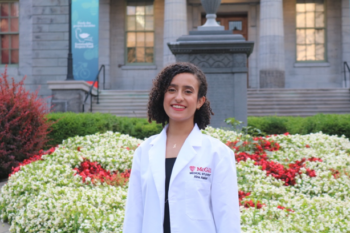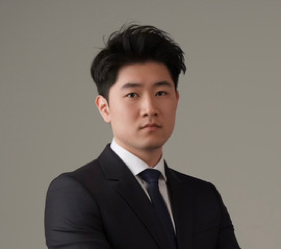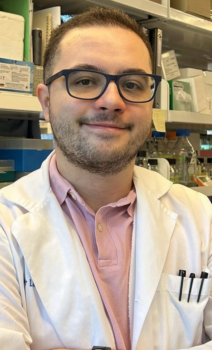When the 2024 Vanier Canada Graduate Scholarships were announced earlier this year, ¬È∂π«¯ fared well once again, with 10 recipients ‚Äì of which five are current MDCM-PhD students.
We asked the students to share some of their thoughts about being selected as Vanier Scholars, their research and why they chose to study at ¬È∂π«¯. Learn more about each below.
Aline AtallahÃ˝

Can you tell us about your research?Ã˝
My research is focused on targeting macrophages to improve survival in glioblastoma. Glioblastoma is the most common type of primary brain tumour and remains very hard to treat. One key feature of this tumour is the accumulation of certain immune cells called macrophages. My research goal is to learn whether I can manipulate the development of these macrophages to favour the accumulation of ‚Äúgood‚Äù anti-tumour subsets. One proposed way to achieve this is by educating or training these cells at the level of the bone marrow so they remember how to fight cancer better. Overall, by understanding the development of these anti-tumoural macrophages and leveraging their ability to mediate cancer death, we can develop novel therapeutics and help glioblastoma patients live longer.Ã˝Ã˝
What makes ¬È∂π«¯ a good place to pursue your research?Ã˝Ã˝
I chose to pursue my MD-PhD at ¬È∂π«¯ due to its supportive environment and state-of-the-art research facilities, such as the Goodman Cancer Institute. My supervisor, Prof. Daniela Quail, offers unparalleled expertise in tumour immunology, making her mentorship invaluable for guiding my research endeavours. Being immersed in such a dynamic and stimulating research community is essential for pushing the boundaries of scientific knowledge and making significant contributions to cancer research. The Department of Experimental Medicine‚Äôs interdisciplinary approach creates an ideal environment for conducting groundbreaking translational research, aligning perfectly with my aspiration to combine clinical investigation with fundamental research.Ã˝
What does it mean to you to be selected as a Vanier Scholar this year?Ã˝
It is a great honour to be selected as a Vanier Scholar. This recognition motivates me to push scientific boundaries and continue my advocacy for less privileged groups. I am committed to leveraging this opportunity to advance scientific knowledge and contribute to a more equitable and inclusive society.Ã˝
Judy Chen

Can you tell us about your research?Ã˝
My research focus is on finding clinically relevant biomarkers for drug-resistant epilepsy patients using multimodal MRI imaging and machine learning techniques. Many drug-resistant epilepsy patients have normal MRIs, and other diagnostic methods are not able to fully localize their epileptogenic zone. This makes it difficult for surgical resection, which is the current gold-standard treatment. Currently, I‚Äôm validating a post-processing MRI pipeline that quantitatively analyzes multimodal MRI images of drug-resistant epilepsy patients and prepares individualized patient reports for surgical planning.Ã˝
What makes ¬È∂π«¯ a good place to pursue your research?Ã˝Ã˝
The Montreal Neurological Institute is world-class academic centre; it is a wonderful environment for collaboration between physicians and researchers and I‚Äôve had the privilege of being able to present our analyses of patients we have scanned at epilepsy rounds and help with clinical decision-making. Being able to directly see the translation of my work and its impact has been incredibly rewarding.Ã˝
What does it mean to you to be selected as a Vanier Scholar this year?Ã˝
It‚Äôs an honour to be selected as a Vanier Scholar and encourages me to continue not only contributing meaningfully to the epilepsy field, but also to continue fostering a culture of empowerment to women physician-scientists and other underrepresented groups in science and medicine.Ã˝
Jae Hyun Byun

Can you tell us about your research?Ã˝
Cardiovascular disease (CVD) is the leading cause of death and disability worldwide. A major driver of CVD is atherosclerosis, which involves the build-up of fats in major arteries forming what is known as plaque. Over time, the plaque can become unstable and rupture, reducing blood flow to vital organs and leading to CVD-related events including heart attacks and strokes. To complicate matters, sex differences exist in plaque morphology and composition; males are more prone to develop unstable plaques, while females tend to exhibit worse outcomes post-stroke. Despite these differences however, there is currently a lack of sex-specific guidelines for atherosclerotic disease management.Ã˝Ã˝
As such, my research explores how sex hormones might influence these differences in unstable atherosclerotic plaques. Sex hormones are chemical messengers that differentiate the biological sex of an individual and have been shown to have several effects on cells present in the plaque. Ultimately, we aim to identify potential markers that relate to sex-specific plaque phenotypes for better stroke risk prediction and management.Ã˝
What makes ¬È∂π«¯ a good place to pursue your research?Ã˝Ã˝
As one of the top medical schools and leading research institutions in the world, I chose to study at ¬È∂π«¯ due to its world-renowned academic research in cardiometabolic diseases. Having worked closely with several Montreal-resident scientists and investigators including Prof. Nabil G. Seidah, who first discovered PCSK9 in relation to LDL cholesterol regulation, and Dr. Stella Daskalopoulou, who champions atherosclerosis research with a specific focus on its instability, joining the MD-PhD community at ¬È∂π«¯ was the perfect opportunity for me to reinforce and increase my exposure to the ongoing breadth of academic research within the cardiovascular field.Ã˝Ã˝
What does it mean to you to be selected as a Vanier Scholar this year?Ã˝Ã˝
Being selected as a Vanier Scholar is an incredible honour that provides me the opportunity to better understand how bench side research can directly impact bed side care that we provide for our patients today. Furthermore, it enables me to have access to cutting-edge resources, collaborate with leading experts, and immerse myself in an environment that continues to foster innovation and excellence.Ã˝
Tarek Taifour

Can you tell us about your research?Ã˝Ã˝
Lung cancer is the most common type of cancer and the leading cause of cancer-related deaths in Canada. Immunotherapies, agents that harness the patients‚Äô immune system to fight tumours, are often used to treat lung cancers but have limited success. Improving response to immunotherapies requires an understanding of how cancers suppress the immune system. Recent data from our lab suggest that this may occur through a protein called Chitinase-3 like 1 (Chi3l1). We have previously shown that this protein prevents immune cells from attacking the cancer, leading to tumour growth. In this project, I will use preclinical models to investigate the role of Chi3l1 in lung cancer and evaluate its utility as a therapeutic target that can improve response to immunotherapies. Our findings will shed light on the potential for Chi3l1 inhibition as a treatment for lung cancersÃ˝
What makes ¬È∂π«¯ a good place to pursue your research?Ã˝Ã˝
I chose ¬È∂π«¯ for my doctoral research because its home to world-leading experts in cancer research and state-of-the-art research facilities. The cutting-edge interdisciplinary research offered at ¬È∂π«¯ provides the perfect complement to its high-quality medical education program.Ã˝
Our lab is located at the Goodman Cancer Institute (GCI), a world-leading centre for cancer research with numerous facilities that are vital to our success. Furthermore, the GCI fosters a collaborative environment where knowledge and expertise are actively shared.‚ÄØThe translational focus of the GCI makes it the ideal environment to start my career by forming critical clinical collaborations and translating our results to the clinic.Ã˝
Jamie Magrill

Can you tell us about your research?Ã˝
My research investigates the role of the tumour microenvironment in patient response to melanoma immunotherapy, applying and adapting cutting-edge technologies to look inside the tumour itself and search for biomarkers of treatment response, with the goal of improving therapy outcomes for metastatic melanoma patients.Ã˝
What makes ¬È∂π«¯ a good place to pursue your research?Ã˝Ã˝
¬È∂π«¯ has a cutting-edge scientific environment with some of the most advanced tools in Canada to examine the tumour microenvironment, enabling us to see with high precision the interplay between cancer cells, normal cells and immune cells, and an excellent mentorship from my supervisor Prof. Ian Watson and through ¬È∂π«¯‚Äôs MD-PhD Program.Ã˝
What does it mean to you to be selected as a Vanier Scholar this year?Ã˝
Being selected as a Vanier scholar has given me the confidence to pursue high-impact research and entrepreneurship (to help bring beneficial medical products from the lab bench to market) and with the support of Vanier and CIHR, to push the boundaries of what‚Äôs possible to accomplish during an MD-PhD!Ã˝

